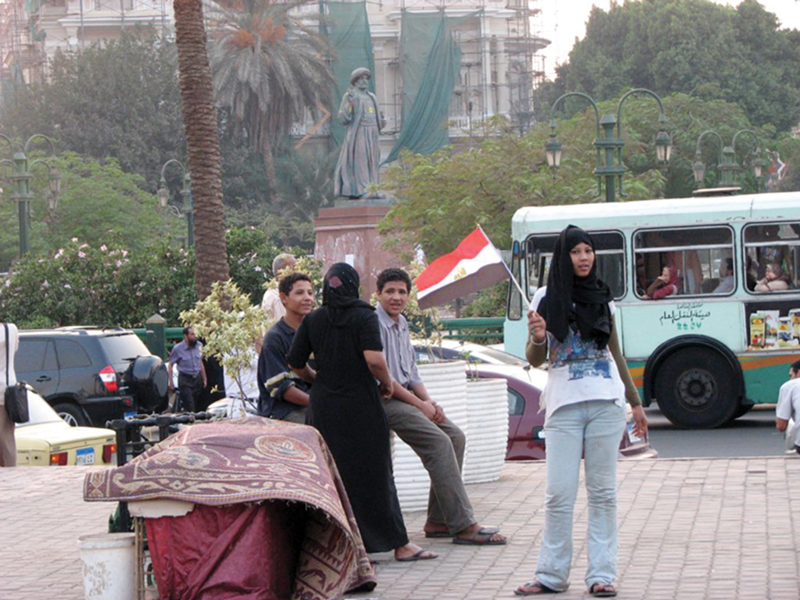In Egypt today the downside of revolution is beginning to be felt. During two weeks recently spent there on a tour to see the ancient sights, and then on my own for several days in Cairo, most people I talked to were ready for order to happen, although glad to have moved ahead.
The uneasy but relatively peaceful atmosphere during my recent visit turned out to be the calm before the storm. In recent days, violent protests have begun again after the military demanded a political role in the new government be inscribed in the constitution. While I was there, though, many natives were hopeful despite the uncertainty.
While the United States thrummed with that clear descendent of the Egyptian overthrow, Occupy Wall Street, in Cairo the always overwhelming traffic was more clogged than ever. Parking restrictions are by the board and unenforced and vendors set up their tables wherever they please, those restrictions no longer in place either.
“Who’s in charge here?” is the unspoken question, and it’s uncertain that the elections at the end of this month will give a definitive answer although a recent power play by the military sparked immediate response from activists and suggested the revolution is far from over.
Voters will elect a parliament on Nov. 28, unless elections are delayed; no date has yet been set for a presidential election. At this time, the nation is without a constitution. People from the educated classes are quick to say that in the old days “of course I didn’t vote.” Elections were fixed, votes were never counted, everything was decided before the vote was taken, according to one of the speakers who filled us in on Egypt today and yesterday.
Dr. Madiha El Safti, a middle-aged, hijab-wearing professor who exemplifies some of the contradictions in Egyptian society, told us she had thought the poor and hungry would be the ones to revolt “but instead it is middle-class young people.”
Inherent problems in remaking Egypt, El Safti says, are “how to incorporate the role of the extended family and religion in the modern, two-salaried world. Many of the young people are leaving for oil-rich countries. The government expects families to take care of themselves in the old manner but since the time of (Gamal Abdel) Nasser, when women began to be educated and then hold jobs, the dynamics have changed.”
Asked if she is optimistic now, she replied, “I try to be. We need luck.”
I asked Amal A. Halim, a professional, educated Muslim woman, if things are different since the revolution. “Yes,” she says. “Much is good. But the rift between religions has widened.”
Our guide later expounded on that subject. “Problems between the Copts and Muslims were not much heard of before the revolution, but they sprang up after,” she says. Corruption in the government had been endemic, she adds, the rich getting richer and the poor poorer, but the consequences of revolution
are still far from being worked out.
A new book (The Better Angels of Our Nature by Steven Pinker) nails the religion problem: “States are far less violent than traditional bands and tribes,” he writes. Right now, with no state, something like bands and tribes are in place, disturbing to responsible people who find their extreme views to be misinterpretations of religion.
Women are highly visible in the revolutionary movement. In Tahrir Square, where people hang out, wave flags, and where action often begins, the crowd is definitely composed of both sexes. Stated goals include improving education for women, establishing their rights in marriage and divorce and facilitating opportunities to run their own businesses.
Although movements to change the status of Egyptian women date back to the 19th century, progress has been “less than expected,” we were told. The hijab, covering the hair but not the face, has a curious recent history in that many middle-aged, urban Egyptian women wearing it now did not in their youth. In Alexandria and Cairo, among today’s young the hijab is a fashion statement as much as anything — and what a statement, ruffled and draped and totally color-coordinated — but farther south where custom persists, it is worn for traditional reasons of modesty.
The full burqa, in which only eyes are exposed, is seen in the cities but not often, and wasn’t prominent in the south either. Perhaps women who dress in the burqa are infrequently out of the house?
Fallout from the revolution has hit hardest at the travel industry, long a strength of the national economy. As a tourist, I talked with many people whose jobs hinge on tourism and who are anxious to have order return. Seventy percent of Aswan and Nile cruise ships aren’t booked at this time, indicative of the slump in general. My tour contained only 14 people, at least 10 short of maximum. The upside is there’s no waiting in line to visit popular sites, you just walk right in, and also that you are made so welcome.
“We love you,” says a young woman working at one of the sites, as a simple statement of fact.
We were in Egypt to see the ancient wonders, but the current happenings added an undeniable frisson to the tour. We learned that the famous Old, Middle and New Kingdoms of several thousands of years ago were separated by “intermediate periods” in which leadership was in question. Egypt seems right now to be in another intermediate period and, if history is indicative, it will pull out of it once again.
But who’s in charge has yet to be determined. Those people who told us they of course had never voted are thinking they will do so this time. Perhaps they will make the difference. ©


